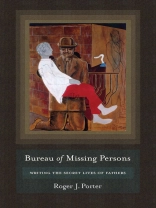A devoted reader of autobiographies and memoirs, Roger J. Porter has observed in recent years a surprising number of memoirs by adult children whose fathers have led secret lives. Some of the fathers had second families; some had secret religious lives; others have been criminals, liars, or con men. Struck by the intensely human drama of secrecy and deception played out for all to see, Porter explores the phenomenon in great depth. In Bureau of Missing Persons he examines a large number of these works—eighteen in all—placing them in a wide literary and cultural context and considering the ethical quandaries writers face when they reveal secrets so long and closely held.
Among the books Porter treats are Paul Auster’s The Invention of Solitude, Alison Bechdel’s graphic memoir Fun Home, Essie Mae Washington-Williams’s Dear Senator (on her father, Strom Thurmond), Bliss Broyard’s One Drop, Mary Gordon’s The Shadow Man, and Geoffrey Wolff’s The Duke of Deception. He also discusses Nathaniel Kahn’s documentary film, My Architect. These narratives inevitably look inward to the writer as well as outward to the parent. The autobiographical children are compelled, if not consumed, by a desire to know. They become detectives, piecing together clues to fill memory voids, assembling material and archival evidence, public and private documents, letters, photographs, and iconic physical objects to track down the parent.
Inhaltsverzeichnis
Introduction: The Child’s Book of Parental Deception 1. Faith-Changing for Life
The Wounds of Memory: Shame and Discovery in the Kurzem Family
Into the Belly of the Beast: Counterfeiting Identity for Survival
Probing Secret Conversions: Helen Fremont’s Anguished Inquisition 2. Deciphering Enigma Codes
Shadowing the Furtive Father Beyond the Grave: Mary Gordon’s Ambivalent Inquiry
‚Love Is No Detective‘: Germaine Greer’s Guilty Hunt
Family on the Lam: A Son Running After Secrets
A Scavenger in the Archives: The ‚Memory Boy‘ Tracks His Parents
The Naked Lady’s Face and the Detective’s Effacement 3. The Men Who Were Not There
Sleuthing Amidst the Shards of the Past: Tracking Absence in the Austers
The Letters and the Flag: Recuperating a Lost Father
Speaking Him into the World: A Daughter Reenters Her Father’s History
A Father Gone Missing: Documenting a Broken Bond 4. Becoming One’s Parent
The Limits of Privacy: Decorum and Exposure at the Ackerley’s
‚Lies Like Contagious Diseases‘: The Secrets of the Duke and His Son
Imagining Himself in the Paternal Matrix
Shared Secrets in the Fun House 5. Breaking the Silence
Race, Secrecy, and Discovery: Black on White, White on Black Conclusion: Freedom or Exploitation?Bibliography
Index
Über den Autor
Roger J. Porter is Professor of English at Reed College. He is the author most recently of Self-Same Songs: Autobiographical Performances and Reflections.












